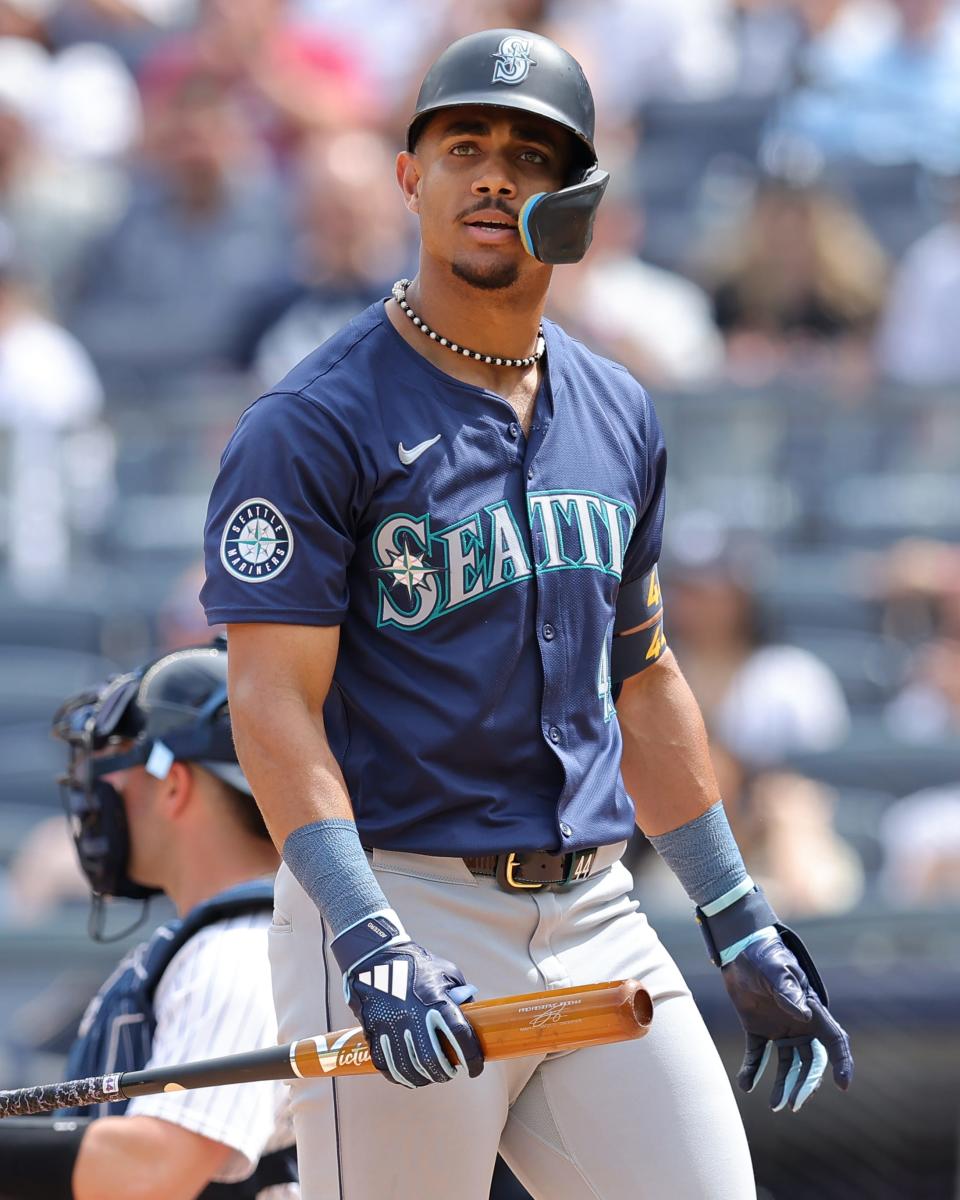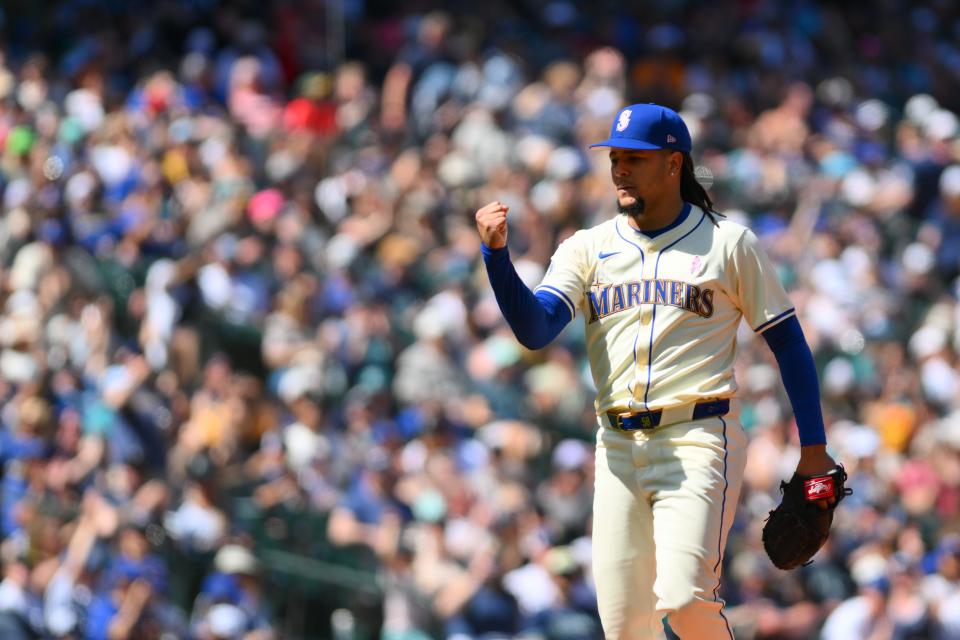First-place Seattle Mariners know what they're doing isn't sustainable in AL West race
If nothing else, these Seattle Mariners are baseball’s ultimate duality, hoarding the game’s most precious and fading commodity to great success, providing the proper foundation to attain the ultimate goal.
“Pitching is king,” notes Mariners catcher Cal Raleigh, proud receiver of a starting rotation that’s pitched more innings than all but one major league club this season. “It doesn’t matter what level you’re playing at. Pitching is always going to be king. I’d say fielding is a close second.
“We do both those things really well. That’s kind of where it has to start.”
Yet it also can’t finish until the Mariners shake free of their albatross: An extended run of hitting futility that exemplifies the worst facets of modern baseball and threatens to nullify their starters’ handiwork.
“I don’t think what we’re doing right now is sustainable – from an offense and pitching standpoint,” notes designated hitter Mitch Garver, who’s lugging a .173 batting average and .280 on-base percentage, yet still finds himself in the middle of Seattle’s lineup most nights.
“We cannot lean on our pitching staff that heavily all year long. We have to figure it out on the offensive front. And we haven’t even come close to reaching our potential on that end.”
And perhaps it’s really that simple.
The Mariners hit the Memorial Day checkpoint almost exactly a .500 team: At 28-26, they are a product of their environment. A legitimate five-man rotation, filled with once and future All-Stars and youngsters with crackling fastballs, leads the majors’ starters in WHIP (1.04), and has thrown the second-most innings, behind only the 38-16 Phillies.
Yet that greatness is largely nullified by an offense that’s 27th in runs, batting average (.224) and OBP (.297) and 24th in OPS (.667) within a historically grim offensive environment. Garver is one of eight regulars or semi-regulars with OBPs between .272 and .306, yet with just three to six home runs.
In other words, an offense with little chance at stringing together three or four hits - yet not hitting enough home runs to make up the shortfall.
That grim pattern extended to superstar Julio Rodriguez, a notoriously slow starter who had just two homers until homering in consecutive games Saturday and Sunday; he has a .306 OBP and 90 adjusted OPS. Rodriguez’s slow start – and he has a career .766 OPS before the All-Star break, .939 after – isn’t the only thing feeling like déjà vu for Mariners fans.

A year ago, they were 28-25 entering Memorial Day and finished with 88 wins, third in the AL West – and a game out of the playoff field.
In 2022, they were 20-28, rallied for 90 wins and a playoff berth before toppling Toronto in the wild-card series but getting swept by Houston in the AL Division Series.
And three years ago, they hit the holiday 28-27, won 90 games, finished second in the West - but missed the wild-card contest by two games.
It’s a pattern the Mariners would love to break. Ah, well.
“This group has relied on the pitching so much over the last two or three years. It just can’t be that way anymore,” says Garver, whose Texas Rangers finished two games ahead of Seattle a year ago and then went on to capture the World Series.
“We need to score more runs and the players – we’ll be the first to say we’re not doing a good enough job, and we’re not.”
Fortunately for the Mariners, the definition of good enough just might be changing.
A mild, mild West
The last week of September has in recent years turned into a grim spin of the roulette wheel for the Mariners. They’re not unlike a student who skates through the first half of class, picks it up for midterms – like the Mariners’ 38-15 rampage through July and August last year – and sees if the final exam goes their way.
Last year, their final was 10 games against the Astros and Rangers, all three teams vying for two playoff spots – and they failed miserably.
Seattle lost five of those first six games and was eliminated on the season’s penultimate day, when Texas won 6-1 at T-Mobile Park. The Mariners have not won the AL West since 2001 – Ichiro Suzuki’s famed Rookie of the Year/MVP campaign – and have spent most of the past decade hovering around 86 wins but looking up at an Astros team that won many more.
Monday night, the Astros begin a four-game series at T-Mobile Park in an unfamiliar position: At 24-29 and 3 ½ games behind Seattle. The defending champion Rangers aren’t much better, at 25-29.
For all their offensive inconsistency – and the Mariners have been held to three runs or less in 11 of their last 20 games – they’re actually in a far better spot than they’re accustomed.
Yet also harbor the sinking feeling that spring struggles sow autumn despair.
“Every game matters but it’s also such a long season,” says Bryan Woo, who debuted in June 2023 and has a 1.66 ERA this year in four starts off the injured list. “We really didn’t play our best ball, or even better baseball, until July or August.
“You stay consistent on things you’re working on, and we always hold ourselves to a really high standard. But also not get caught up because you’re going to have bad games.
“Regulate the highs and lows. Keep on chugging.”
Fortunately, Woo and his colleagues are pretty good at regulating.
‘The best trade we’ve ever made’
The Mariners’ identity was solidified for the better on July 30, 2022, when trade-happy but arbitrage-loving GM Jerry Dipoto dealt four prospects – including prized infielder Noelvi Marte – to the Cincinnati Reds for Luis Castillo, a couple weeks after Castillo’s second All-Star appearance.
Suddenly, Seattle’s annual trudge toward 85-ish wins had a north star.
Paired with reigning Cy Young winner Robbie Ray, Castillo won four games and gobbled up 65 innings down the stretch. He carried a shutout into the eighth inning of the Mariners’ first playoff game in 22 years, beating Toronto to kick-start a wild-card sweep.
And has arguably been even more valuable since.
After signing a $108 million contract extension, Castillo has lent definition and occasional dominance to rotation mates Logan Gilbert, George Kirby, Woo and Bryce Miller, who range in age from 24 to 27.
“Absolutely the best trade we’ve ever made,” says Mariners manager Scott Servais. “We gave up some really good young prospects, but to get a guy like that – a top of the rotation guy, the job he does every fifth day when he takes the ball, but also what he does for Logan and George and Bryce and Bryan, when you have that lead dog out ahead.
“Those guys are awesome young pitchers. Luis has a lot more experience, the ability to work through lineups. He has a certain persona about him like he’s the guy – and he loves that.
“It was probably a little bit painful for some in the organization because you give up a lot of good young players, but – risk vs. reward. You gotta know when to shoot the bullets and we did a great job.”

Gilbert and Castillo rank third and 10th in the majors in innings pitched, respectively. Now in his fourth season and possibly headed to his first All-Star Game, Gilbert has taken on a greater leadership role with the younger pitchers.
But all take their cues from Castillo, 31, the lone veteran after Ray underwent flexor tendon surgery and was traded.
“He understands us really well, every person’s personality type,” says Gilbert of Castillo. “I think he just has that calming presence and this confidence about him. I’ve gone to him plenty of times and he’s helped me take a step back, understand what you do well and not really worry about anything else.
“I feel like there can be a lot more searching when you’re on your own. You can go through great times and the bad times can be rough.”
The organization’s pitching program – helmed at the big league level by pitching coach Pete Woodworth, pitching strategy director Trent Blank and former big league reliever Danny Farquhar – has reinforced the talent unearthed by the club’s scouting and development.
Woo has been untouchable since returning from elbow inflammation, allowing just 14 baserunners in 21 ⅔ innings, just three years after he was picked in the sixth round out of Cal Poly San Luis Obispo.
“My first start wasn’t very good and I didn’t know what to do,” Woo says of a major-league debut in which he gave up six runs in three innings to Texas last June 3. “They were like, ‘You don’t need to change anything, just use things a little different here or there and have confidence in what you do.’
“That was a pretty big deal for me coming up. The message is, ‘You’re here for a reason. Keep doing what you do really well. Continue taking advantage of your strengths.’”
Don't look up
The Mariners would prefer to balance their strengths. Saturday, after another feeble offensive effort in a 3-1 loss to the Nationals, Servais called a team meeting, reiterating well-worn themes for a club that lost its fourth in a row.
“I think we’re capable of much, much more,” Servais said before the series. “That was the original thought when we put the team together. I think the players agree with me on that one.”
Mercifully, they took advantage of Nationals starter Patrick Corbin's 6.29 ERA coming into Sunday and amassed 10 hits in a 9-5 win to cap a 4-6 road trip that began in Baltimore and Yankee Stadium.
Now, the Astros, and the rest of the summer. As always, the Mariners are in it. They have learned that there’s no time like the present to seize some control of their destiny.
“You don’t want to look up and we finish last season in a three-way tie with Texas and Houston – who even gets in? Texas ends up winning the whole thing,” says Gilbert.
“It came down to the wire. It’s great to be in that position. But if you win three or four you should’ve won in May or June that you might’ve lost by one run - those games really come back to matter at the end.”
This article originally appeared on USA TODAY: Seattle Mariners lead AL West standings, but this isn't sustainable

 Yahoo Sports
Yahoo Sports 
